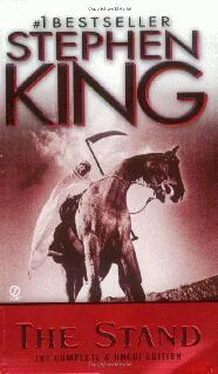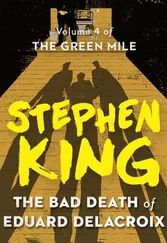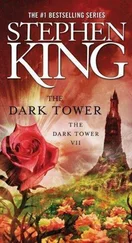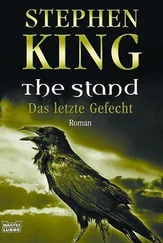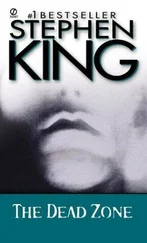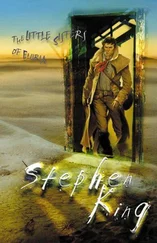Stu woke up, his harsh breathing loud in his ears. Had he screamed?
Tom was still asleep, huddled so deeply in his sleeping bag that Stu could only see his cowlick. Kojak was curled at Stu’s side. Everything was all right, it had only been a dream—
And then a single howl rose in the night, climbing, ululating, a silver chime of desperate horror… the howl of a wolf, or perhaps the scream of a killer’s ghost.
Kojak raised his head.
Gooseflesh broke out on Stu’s arms, thighs, groin.
The howl didn’t come again.
Stu slept. In the morning they packed up and went on. It was Tom who noticed and pointed out that the deer guts were all gone. There was a flurry of tracks where they had been, and the bloodstain of Stu’s kill faded to a dull pink on the snow… but that was all.
Five days of good weather brought them to Rifle. The next morning they awoke to a deepening blizzard. Stu said he thought they should wait it out here, and they put up in a local motel. Tom held the lobby doors open and Stu drove the snowmobile right inside. As he told Tom, it made a handy garage, although the snowmobile’s heavy-duty tread had chewed up the lobby’s deep-pile rug considerably.
It snowed for three days. When they awoke on the morning of December 10 and dug themselves out, the sun was shining brightly and the temperature had climbed into the mid-thirties. The snow was much deeper now, and it had gotten more difficult to read the twists and turns of I-70. But it wasn’t keeping to the highway that worried Stu on that bright, warm, and sunny day. In the late afternoon, as the blue shadows began to lengthen, Stu throttled down and then killed the snowmobile’s engine, his head cocked, his whole body seeming to listen.
“What is it, Stu? What’s—” Then Tom heard it, too. A low rumbling sound off to their left and up ahead. It swelled to a deep express-train roar and then faded. The afternoon was still again.
“Stu?” Tom asked anxiously.
“Don’t worry,” he said, and thought: I’ll worry enough for both of us .
The warm temperatures held. By December 13 they were nearly to Shoshone, and still climbing toward the roof of the Rockies—for them the highest point they would reach before beginning to descend again would be Loveland Pass.
Again and again they heard the low rumble of avalanches, sometimes far away, sometimes so close that there was nothing to do but look up and wait and hope those great shelves of white death would not blot out the sky. On the twelfth, one swept down and over a place where they had been only half an hour before, burying the snowmobile’s track under tons of packed snow. Stu was increasingly afraid that the vibration caused by the sound of the snowmobile’s engine would be what finally killed them, triggering a slide that would bury them forty feet deep before they even had time enough to realize what was happening. But now there was nothing to do but press on and hope for the best.
Then the temperatures plunged again and the threat abated somewhat. There was another storm and they were stopped for two days. They dug out and went on… and at night the wolves howled. Sometimes they were far away, sometimes so close that they seemed right outside the shelter halves, bringing Kojak to his feet, growling low in his chest, as taut as a steel spring. But the temperatures remained low and the frequency of the avalanches diminished, although they had another near miss on the eighteenth.
On December 22, outside the town of Avon, Stu ran the snowmobile off the highway embankment. At one moment they were running along at a steady ten miles an hour, safe and fine, spuming up clouds of snow behind them. Tom had just pointed out the small village below, silent as a 1980s stereopticon image with its single white church steeple and the undisturbed drifts up to the eaves of the houses. The next moment the cowling of the snowmobile began to tilt forward.
“What the fuck—” Stu began, and that was all he had time for.
The snowmobile canted farther forward. Stu throttled back, but it was too late. There was a peculiar sensation of weightlessness, the feeling you have when you have just left the diving board and the pull of gravity just matches the force of your upward spring. They were pitched off the machine head over heels. Stu lost sight of Tom and Kojak. Cold snow up his nose. When he opened his mouth to shout, the snow went down his throat. Down the back of his coat. Tumbling. Falling. Finally coming to rest in a deep white quilt of snow.
He fought his way up like a swimmer, gasping hot fire. His throat had been snowburned.
“Tom!” he shouted, treading snow. Oddly enough, from this angle he could see the highway embankment very clearly, and where they had run off it, causing their own small avalanche as they did so. The rear end of the snowmobile jutted out of the snow about fifty feet farther down the steep gradient. It looked like an orange buoy. Strange how the water imagery persisted… and by the way, was Tom drowning?
“Tom! Tommy! ”
Kojak popped up, looking as if he had been dusted from stem to stern with confectioners sugar, and breasted his way through the snow toward Stu.
“Kojak!” Stu shouted. “Find Tom! Find Tom! ”
Kojak barked and struggled to turn around. He headed toward a churned-up place in the snow and barked again. Struggling, falling, eating snow, Stu got to the place and felt around. One gloved hand snagged Tom’s jacket and he gave a furious yank. Tom bobbed up, gasping and retching, and they both fell on top of the snow on their backs. Tom whooped and gasped.
“My throat! It’s all hot! Oh laws, lawsy me—”
“It’s the cold, Tom. It goes away.”
“I was choking—”
“It’s all right now, Tom. We’re going to be okay.”
They lay on top of the snow, getting their wind back. Stu put his arm around Tom’s shoulders to still the big fellow’s trembling. A distance away, gaining volume and then diminishing, was the rumbling cold sound of another avalanche.
It took them the rest of the day to get the three quarters of a mile between the place where they had run off the road and the town of Avon. There was no question of salvaging the snowmobile or any of the supplies lashed to it; it was just too far down the grade. It would stay there until spring, at least—maybe forever, the way things were now.
They got to town half an hour past dusk, too cold and winded to do anything but build a fire and find a halfway warm place to sleep. That night there were no dreams—only the blackness of utter exhaustion.
In the morning, they set about the task of reoutfitting themselves. It was a tougher job in the small town of Avon than it had been in Grand Junction. Again Stu considered just stopping and wintering here—if he said it was the right thing to do, Tom would not question him, and they had had an explicit lesson in what happened to people who pressed their luck just yesterday. But in the end, he rejected the idea. The baby was due sometime in early January. He wanted to be there when it came. He wanted to see with his own eyes that it was all right.
At the end of Avon’s short main street they found a John Deere dealership, and in the garage behind the showroom they found two used Deere snowmobiles. Neither of them was quite as good as the big Highway Department machine Stu had driven off the road, but one of them had an extra-wide cleated driving tread, and he thought it would do. They found no concentrates and had to settle for canned goods instead. The latter half of the day was spent ransacking houses for camping gear, a job neither of them relished. The victims of the plague were everywhere, transformed into grotesquely decayed ice-cave exhibits.
Near the end of the day they found most of what they needed in one place, a large rooming house just off the main drag. Before the superflu struck, it had apparently been filled with young people, the sort who came to Colorado to do all the things John Denver used to sing about. Tom, in fact, found a large green plastic garbage bag in the crawlspace under the stairs filled with a very potent version of “Rocky Mountain High.”
Читать дальше
